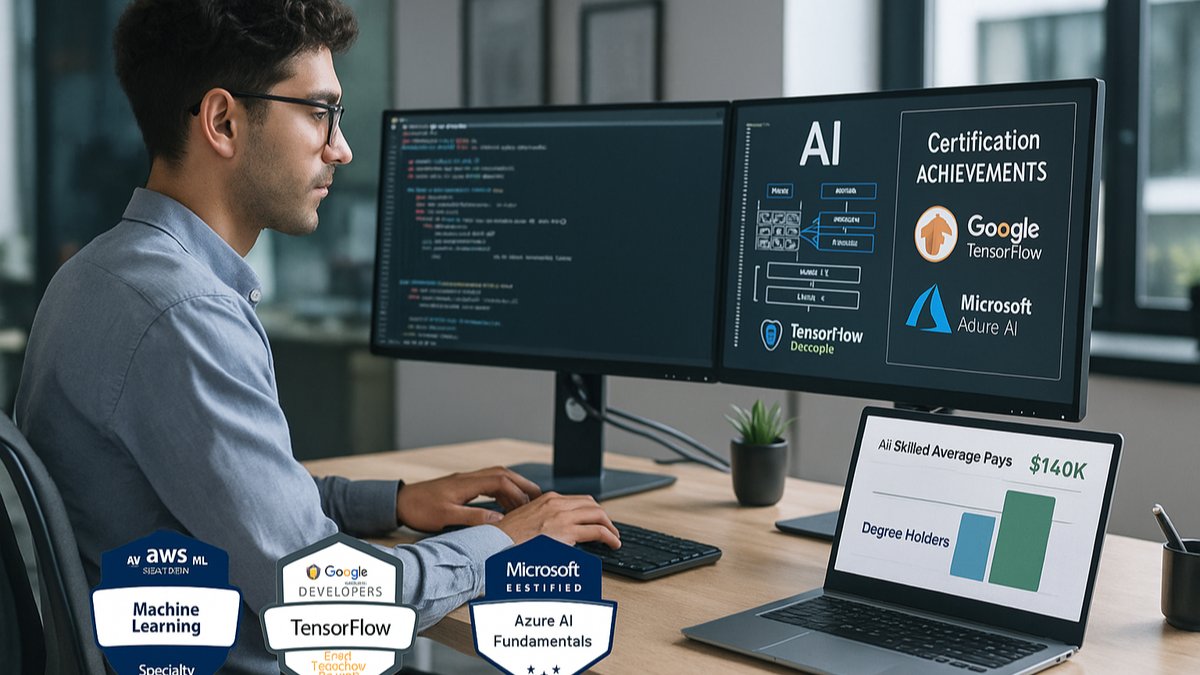AI Skills Matter More Than Degrees in 2025 Career Guide
The professional landscape has fundamentally shifted, and the evidence is undeniable: AI skills matter more than traditional degrees in today’s job market. While universities continue promoting expensive degree programmes, forward-thinking professionals are discovering that practical AI capabilities deliver better career outcomes, higher salaries, and more job opportunities than conventional academic credentials.
This transformation isn’t coming. it’s already here, reshaping how employers evaluate talent and how professionals build successful careers.
Why AI Skills Matter More: The Data Speaks
The statistics tell a compelling story about why AI skills matter more than degrees in modern hiring decisions. McKinsey predicts that by 2030, over 70% of AI-related roles will prioritise certifications and practical experience over traditional degrees, reflecting a fundamental shift toward competency-based recruitment strategies.
The financial evidence supporting why AI skills matter more is equally dramatic. A comprehensive study found that AI skills command a wage premium of 23%, exceeding the value of degrees up until the PhD level. This means professionals with demonstrated AI capabilities often out-earn PhD holders who lack practical AI experience.
The National Association of Colleges and Employers found that 96% of companies now use skills-based hiring in some capacity, with more than half using skills as their primary evaluation criteria. When AI skills matter more than academic credentials, smart professionals adapt their development strategies accordingly.
The Degree Devaluation: Why Traditional Education Falls Short
Understanding why AI skills matter more requires examining how traditional education has become misaligned with employer needs. Degree programmes, designed for yesterday’s job market, often fail to provide the practical AI competencies that drive real business value in 2025.
Burning Glass Institute’s research revealed that 60% of employers prioritise candidates with certifications or practical experience over those with traditional degrees. The reason is straightforward: businesses need professionals who can deliver immediate value, not theoretical knowledge that may be obsolete by graduation.
Education requirements for AI engineers are shifting dramatically. While PhD requirements once dominated AI job postings, current data shows an almost even split among degree levels, with 25% of AI positions having no specific degree requirement. This indicates that when AI skills matter more than academic credentials, professionals can access opportunities regardless of educational background.
The Practical AI Skills That Transform Careers
When AI skills matter more than degrees, understanding which capabilities deliver the highest value becomes crucial for career success. Key skills dominating the AI talent landscape include Python, TensorFlow, PyTorch, and natural language processing (NLP), but the most valuable professionals combine technical abilities with strategic business understanding.
High-Impact AI Skills Include:
- Machine learning model development and optimization
- Natural language processing and conversational AI systems
- Computer vision and automated image recognition
- AI model training, testing, and production deployment
- Prompt engineering and AI tool optimization strategies
- Data science integration with business intelligence systems
Proficiency in frameworks like TensorFlow and PyTorch has become highly sought after for machine learning roles. However, technical skills alone aren’t sufficient; employers increasingly value professionals who can translate AI capabilities into measurable business improvements.
The Certification Advantage: Why AI Skills Matter More

The rise of AI-focused certifications demonstrates why AI skills matter more than traditional academic programmes. Certifications such as Google’s TensorFlow Developer Certificate, Microsoft’s Azure AI Engineer Associate, and AWS Machine Learning Speciality provide credible alternatives to formal education with several distinct advantages.
Immediate Industry Relevance: Certification programmes focus on current industry practices rather than theoretical foundations that may become outdated. When AI skills matter more than academic theory, practical training delivers superior career value.
Project-Based Learning: Most AI certifications require building real applications that demonstrate actual competency rather than test-taking ability. This hands-on approach proves why AI skills matter more than theoretical knowledge in hiring decisions.
Cost-Effective Development: Professional certifications cost thousands rather than tens of thousands of dollars while providing more targeted, job-relevant training. When AI skills matter more than expensive degrees, smart professionals choose efficient skill development paths.
Rapid Skill Acquisition: AI certifications can be completed in months rather than years, enabling quick career transitions and skill updates that keep pace with technological advancement.
Success Stories: When AI Skills Matter More Than Credentials
Real-world evidence consistently demonstrates why AI skills matter more than academic credentials in today’s competitive job market. A CourseCareers case study found that graduates from AI-focused training programmes were twice as likely to secure roles compared to candidates with only academic qualifications.
Organisations that prioritise skills over degrees reduce their average recruitment timelines by 18%, according to Deloitte’s research. LinkedIn’s Global Hiring Trends Report highlights that skills-first hiring practices attract candidates from non-traditional backgrounds, contributing to a 25% increase in applications from under-represented groups.
McKinsey’s Workforce Transformation Report reveals that employees hired based on skills are 30% more productive during their first six months than those hired based on degrees alone. This productivity advantage explains why AI skills matter more than academic credentials in performance-driven organisations.
Industry Evidence: AI Skills Matter More Across Sectors
The principle that AI skills matter more than degrees extends across industries, not just technology companies. PwC’s 2025 Global AI Jobs Barometer reveals that every industry analysed pays wage premiums for AI skills, indicating universal recognition of practical AI competency value.
Healthcare: AI skills in medical imaging and diagnostic assistance command premium compensation regardless of medical degree specialisation.
Finance: Machine learning capabilities for fraud detection and algorithmic trading outweigh traditional finance education in hiring decisions.
Manufacturing: Computer vision expertise for quality control systems matters more than engineering degrees without AI experience.
Marketing: Natural language processing skills for content automation and customer behaviour analysis trump traditional marketing education.
The Skills-First Career Strategy
For professionals wondering whether AI skills matter more than pursuing additional education, current market dynamics provide clear direction. Nearly half of AI job postings accept master’s or bachelor’s degrees while emphasising practical experience, and 25% require no specific degree.
The most effective career strategy recognises that AI skills matter more than academic credentials while building competency through practical projects, certifications, and hands-on experience that demonstrates real-world problem-solving abilities.
Strategic Development Approach:
- Focus on building portfolio projects that demonstrate AI implementation
- Pursue industry-recognized certifications rather than additional degrees
- Develop expertise in high-demand frameworks and programming languages
- Build experience through freelance projects and open-source contributions
- Network with AI professionals and participate in technical communities
The Competitive Reality: AI Skills Matter More for Career Success
The evidence consistently demonstrates that AI skills matter more than traditional degrees for career advancement, salary growth, and job security in 2025’s technology-driven economy. Technological skills are projected to grow in importance more rapidly than any other skills in the next five years.
Smart professionals are investing in AI capabilities that deliver immediate employer value rather than pursuing additional academic credentials that may be obsolete before completion. The future belongs to those who can demonstrate practical AI competency through real projects, measurable results, and continuous skill development.
Conclusion: The Skills-First Future
The transformation is complete: AI skills matter more than degrees in 2025’s job market. The professionals who thrive will be those who embrace this reality and invest their time, energy, and resources in developing practical AI capabilities that solve real business problems.
The question isn’t whether AI skills matter more than degrees; the data has already answered that definitively. The question is how quickly you can develop the AI competencies that transform your career prospects in an increasingly skills-focused economy.
Stop waiting for permission from traditional institutions. Start building the AI skills that matter more than any degree ever could.
Author








